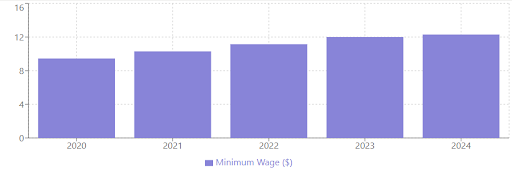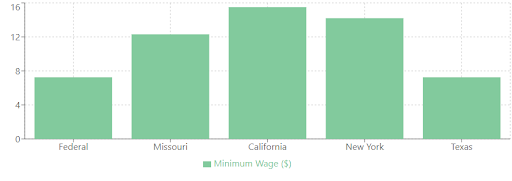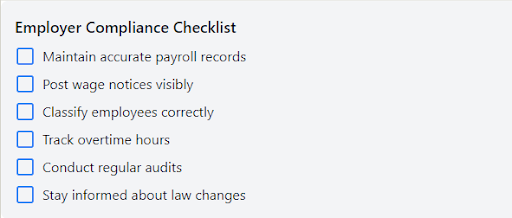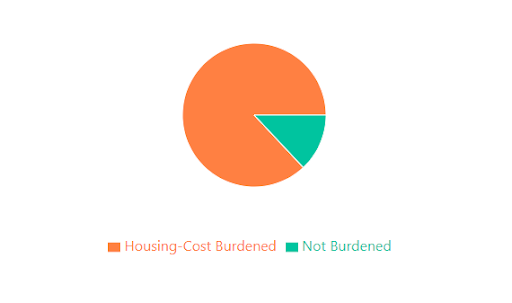Contents
- 1 Current Missouri Minimum Wage
- 2 How Missouri’s Minimum Wage Compares
- 3 Exemptions and Special Cases
- 4 The Impact of Missouri’s Minimum Wage
- 5 Future of Missouri’s Minimum Wage
- 6 Compliance and Best Practices for Employers
- 7 The Living Wage Debate
- 8 Impact on Specific Demographics
- 9 Minimum Wage and Housing Affordability
- 10 Health and Food Security Implications
- 11 Conclusion
Current Missouri Minimum Wage
As of January 1, 2024, the Missouri minimum wage stands at $12.30 per hour. This rate applies to most private businesses in the state, with a few exceptions that we’ll explore later in this article.

This chart illustrates the steady increase in Missouri’s minimum wage over the past five years, reflecting the state’s commitment to improving workers’ compensation.
How Missouri’s Minimum Wage Compares
Missouri’s minimum wage of $12.30 per hour is significantly higher than the federal minimum wage of $7.25, which has remained unchanged since 2009. This positions Missouri among the more progressive states in terms of worker compensation.

This comparison shows how Missouri’s minimum wage stacks up against the federal rate and those of other notable states.
Exemptions and Special Cases
While the $12.30 hourly rate applies to most workers, there are some important exceptions:
- Tipped Employees: Employers must pay tipped workers at least 50% of the minimum wage ($6.15 per hour) plus tips. If tips don’t bring the total to $12.30 per hour, the employer must make up the difference.
- Small Businesses: Retail or service businesses with annual gross income below $500,000 may pay less than the state minimum wage.
- Full-Time Students: Some full-time students working part-time can be paid 85% of the minimum wage.
- Agricultural Workers: Most farm employees are exempt from the Missouri minimum wage.
- Public Employers: The state minimum wage law doesn’t apply to public employers.
The Impact of Missouri’s Minimum Wage
The effects of the minimum wage extend far beyond individual paychecks. Let’s explore its broader impact:
Economic Effects
- Consumer Spending: Higher wages often lead to increased consumer spending, potentially boosting local economies.
- Business Costs: Some businesses may face higher labor costs, which could affect pricing or hiring practices.
- Job Market: There’s ongoing debate about whether higher minimum wages affect job availability, with studies showing mixed results.
- Poverty Reduction: Higher wages can help lift workers out of poverty, reducing reliance on public assistance programs.
- Quality of Life: Better wages can lead to improved living conditions and access to healthcare for low-income workers.
- Income Inequality: Raising the minimum wage is one strategy to address growing income disparities.
Future of Missouri’s Minimum Wage
The future of Missouri’s minimum wage is a topic of ongoing discussion and potential change. Here are key points to consider:
- Proposition A: A ballot initiative for the November 2024 election proposes increasing the minimum wage to $15 per hour by 2026, starting with $13.75 in 2025.
- Paid Sick Leave: The same proposition includes provisions for mandatory paid sick leave, potentially affecting over 728,000 private sector workers.
- Economic Projections: If passed, the Missouri Budget Project estimates that the wage increase could inject over $609 million in new wages into the state’s economy.
- Ongoing Adjustments: Missouri’s minimum wage is currently indexed to inflation, allowing for annual adjustments based on the Consumer Price Index.
Compliance and Best Practices for Employers
Ensuring compliance with Missouri’s minimum wage laws is crucial for businesses. Here are some best practices:
- Accurate Payroll: Maintain precise records of hours worked and wages paid.
- Clear Communication: Post wage notices in visible areas of the workplace.
- Proper Classification: Correctly categorize employees as exempt or non-exempt.
- Overtime Tracking: Accurately monitor and compensate overtime hours.
- Regular Audits: Conduct periodic internal audits to ensure ongoing compliance.
- Stay Informed: Keep up-to-date with any changes in state labor laws.

The Living Wage Debate
While the minimum wage sets a legal baseline, there’s growing discussion about the concept of a “living wage” – the income necessary to meet basic needs. According to MIT’s Living Wage Calculator, the living wage in Missouri varies by region:
- St. Louis City: $19.11/hour
- Jackson County (includes Kansas City): $20.93/hour
- Ozark County: $18.89/hour
- Greene County: $18.86/hour
- Boone County: $19.03/hour
These figures highlight the gap between the current minimum wage and what’s considered necessary for a comfortable living standard in different parts of Missouri.
Impact on Specific Demographics
The minimum wage affects various groups differently:
- Women: Nearly one in three working women would see wage increases with a rise to $15/hour.
- Racial Minorities: Over one in three workers from marginalized racial groups would benefit from the proposed increase.
- Parents: One in four workers who would see increased wages are parents.
- Older Workers: Over 78,000 workers aged 55 or over would benefit from a wage increase to $15/hour.
Minimum Wage and Housing Affordability
The relationship between minimum wage and housing costs is a critical issue:
- At the current $12.30/hour wage, a Missourian needs to work 55 hours weekly to afford a modest one-bedroom rental at Fair Market Rent.
- 87% of extremely low-income Missouri households are housing-cost burdened, spending over 30% of their income on housing.
- Studies show that minimum wage increases can reduce rental defaults by up to 25.7% over three months.

This chart illustrates the high percentage of extremely low-income Missouri households facing housing cost burdens.
Health and Food Security Implications
Minimum wage levels have significant implications for health and food security:
- Increased wages are associated with improved food quantity and nutritional quality in households.
- Missouri has a food insecurity rate of at least 15%, affecting 924,180 people as of 2022.
- Studies have shown positive health impacts of wage increases, including:
- Improved birth weights
- Decreased suicide rates among adults with lower education levels
Conclusion
Missouri’s minimum wage is a complex issue with far-reaching effects on the state’s economy, workforce, and social fabric. As debates continue and potential changes loom, it’s crucial for both employers and employees to stay informed and engaged in the ongoing dialogue about fair compensation and its broader impacts on society.
Whether you’re a business owner ensuring compliance, an employee understanding your rights, or a policymaker considering future adjustments, the minimum wage remains a critical component of Missouri’s economic landscape. By staying informed and adaptable, we can work towards a system that balances business needs with fair compensation for workers across the state.





